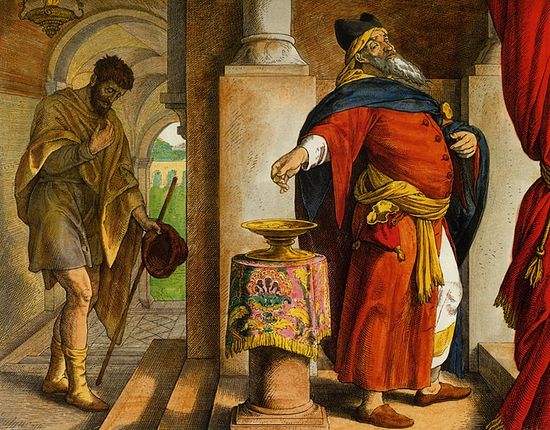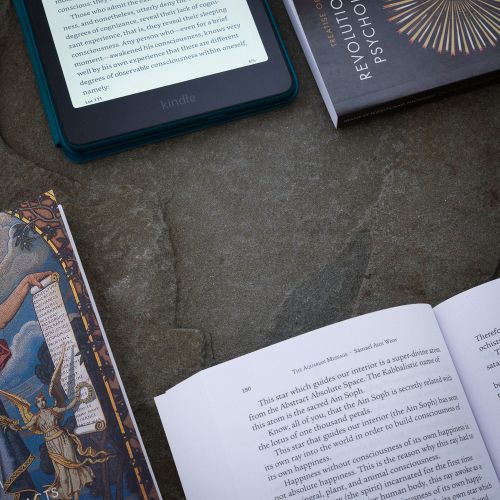Pharisee
"from Old English Fariseos, Old French pharise (13c.), and directly from Late Latin Pharisæus, from Greek Pharisaios, from Aramaic perishayya, emphatic plural of perish "separated, separatist," corresponding to Hebrew parush, from parash "he separated." Ancient Jewish sect (2c. B.C.E.-1c. C.E.) distinguished by strict observance but regarded as pretentious and self-righteous, at least by Jesus (Matt. xxiii:27). Meaning "self-righteous person, formalist, hypocrite" is attested from 1580s." —Online Etymology Dictionary
 “Two men went up into the temple to pray; the one a Pharisee, and the other a Publican. The Pharisee stood and prayed thus with himself, ‘God, I thank thee, that I am not as other men are, extortioners, unjust, adulterers, or even as this Publican. I fast twice in the week, I give tithes of all that I possess.’ And the Publican standing afar off, would not lift up so much as his eyes unto heaven, but smote upon his breast, saying, ‘God be merciful to me, a sinner.’ I tell you, this man went down to his house justified rather than the other: for every one that exalteth himself shall be abased; and he that humbleth himself shall be exalted.” —Luke 18: 10-14
“Two men went up into the temple to pray; the one a Pharisee, and the other a Publican. The Pharisee stood and prayed thus with himself, ‘God, I thank thee, that I am not as other men are, extortioners, unjust, adulterers, or even as this Publican. I fast twice in the week, I give tithes of all that I possess.’ And the Publican standing afar off, would not lift up so much as his eyes unto heaven, but smote upon his breast, saying, ‘God be merciful to me, a sinner.’ I tell you, this man went down to his house justified rather than the other: for every one that exalteth himself shall be abased; and he that humbleth himself shall be exalted.” —Luke 18: 10-14
"All of us think that we will never pronounce those words of the Pharisee in the biblical parable, “God, I thank thee that I am not as other men are,” etc. Nevertheless, and even if this might appear incredible, this is the way we behave daily. The butcher in the market says, “I am not like the rest of the butchers that sell bad quality meat and exploit people.” The vendor of textiles in the store exclaims, “I am not like the rest of the merchants that know how to steal when measuring and who have grown rich.” The milk vendor affirms, “I am not like the rest of the milk vendors that put water in their milk. I like to be honest.” The mistress of the house comments to her visitor the following, “I am not like such a lady who flirts with other men. I am, thanks to God, a decent person, since I am faithful to my husband.” Conclusion: Others are scoundrels, unjust, adulterers, thieves and perverse persons; yet each one of us is a humble lamb, “a saint with a golden halo,” who is worthy to be shown as a golden masterpiece inside any temple. How foolish we are! We often think that we never do all the foolishness and perversities that we see others do; this is why we arrive at the conclusion that we are magnificent persons. Unfortunately, we do not see the foolishness and wretched things we do." —Samael Aun Weor, Treatise of Revolutionary Psychology
"Jesus, the great Kabir, warned his disciples by saying: Take heed and beware of the leaven of the Pharisees and the Sadducees. - Matthew 16:6 Obviously, with this warning Jesus the Christ was refer- ring to the doctrines of the materialistic Sadducees and the hypocritical Pharisees. The doctrine of the Sadducees is the Sensual Mind. It is the doctrine of the five senses. The doctrine of the Pharisees is irrefutably and without dispute situated in the Intermediate Mind. Clearly, the Pharisees gather at their rites in order to be seen, so that it will be said that they are good people. They pretend in front of others, but they never work on themselves." —Samael Aun Weor, The Great Rebellion
"The interior Pharisee is an obstacle to comprehension. To presume that we are virtuous is absurd." —Samael Aun Weor, The Mystery of the Golden Blossom
"Mystical pride is a characteristic of the interior Pharisee. These are people who boast of being initiates, saints, and wise, who renounce sex without having previously built the solar bodies, without having previously worked in the ninth sphere, without previously reaching the Second Birth; thus, they wind up developing the abominable Kundabuffer organ. It is difficult to take these mistaken but sincere people away from their error, since they feel themselves to be super-transcended; they boast about being gods without ever having placed a foot on the first rung of the holy ladder." —Samael Aun Weor





